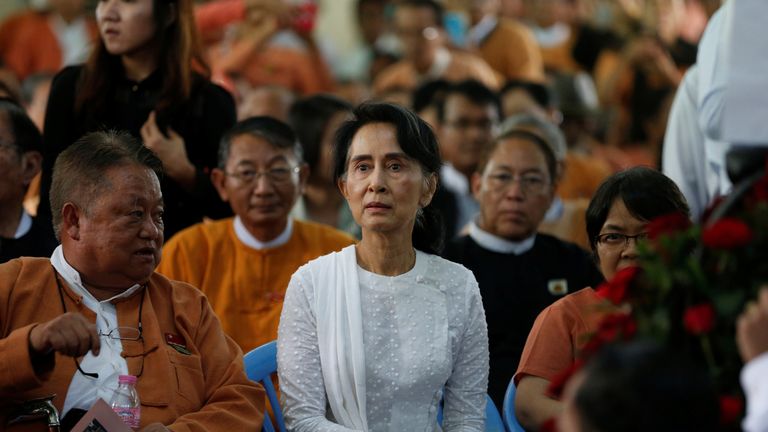Rohingya treatment amounts to 'dehumanising apartheid' - Amnesty report
Amnesty International says refugees cannot be expected to return to a system of "state-sponsored" discrimination in Myanmar.
Tuesday 21 November 2017 07:38, UK
Myanmar's treatment of Rohingya Muslims amounts to "dehumanising apartheid," according to a new human rights report.
The study by Amnesty International details how years of persecution led to the crisis that has seen 620,000 refugees fleeing to Bangladesh - many with harrowing stories of murder, rape and arson at the hands of Myanmar troops.
The report - based on two years of research - says a "state-sponsored" campaign has restricted virtually all aspects of the Rohingya's lives, confining them to a "ghetto-like" existence.
Amnesty says the treatment meets the legal standard of the "crime against humanity of apartheid".
:: Explained: The Rohingya refugee crisis
:: Sky Views: Democracy can't be built on Rohingya bones
Amnesty's senior director for research Ana Neistat said: "Rakhine State is a crime scene. This was the case long before the vicious campaign of military violence of the last three months."
She said the Myanmar authorities "are keeping Rohingya women, men and children segregated and cowed in a dehumanising system of apartheid."
The hatred for the Muslim group in mainly Buddhist Myanmar dates back to a 1982 citizenship law enacted by the military junta, which effectively made hundreds of thousands of Rohingya stateless.
Since then, Amnesty says, the state has waged a "deliberate campaign" to undermine the Rohingya, who are ostracised as "Bengalis" or illegal migrants from Bangladesh.
:: Why is Rohingya crisis not classed as genocide?
The repression intensified after an outbreak of violence between Buddhist and Muslim communities in 2012, with the Rohingya driven out of urban areas of Rakhine state.
Even before the recent military crackdown, they were unable to travel freely, needing special permits and facing arrest, abuse and harassment at checkpoints.
They remain completely segregated from the Buddhist community, confined by barbed wire and police checkpoints to camps that Amnesty calls an "open-air prison".
The Muslim community is widely denied access to medical care, their children are unable to attend government schools while many mosques have been sealed off.
Amnesty raises questions about how the Rohingya would be treated if they return to Myanmar.
Anna Neistat said: "Restoring the rights and legal status of Rohingya, and amending the country's discriminatory citizenship laws is urgently needed.
"Rohingya who have fled persecution in Myanmar cannot be asked to return to a system of apartheid."
Pressure has been mounting on Myanmar's political leader Aung San Suu Kyi amid international outcry at the suffering of the Rohingya people.
After Sky News reported from inside Myanmar on the humanitarian disaster, Theresa May said the crisis "looks like ethnic cleansing" during a major foreign policy speech.
Last week, Human Rights Watch accused Myanmar security forces of a systematic campaign of sex crimes - including the rape of women and girls - against the community.
Speaking at an Asia Europe meeting in Myanmar's capital Naypyitaw overnight, Ms Su Kyi said she hopes talks with Bangladesh this week will result in a memorandum of understanding on the "safe return" of the Rohingya who have fled to Bangladesh.
But she warned that the crisis could not be solved "overnight".






